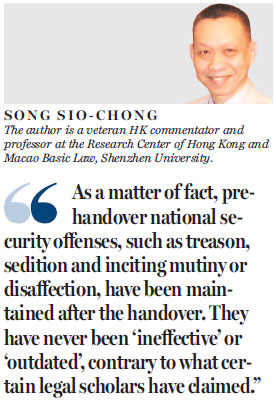Separatist moves are indictable
Updated: 2016-04-08 08:45
By Song Sio-chong(HK Edition)
|
|||||||||
Song Sio-chong says actions of treason and sedition may be subject to prosecution under the current legal system in HK even if the security bill has not been passed
A former "Occupy Central" activist announced at a press conference that a "Hong Kong National Party" is being formed, with an agenda to abolish the Hong Kong Basic Law and establish an independent "Hong Kong Republic".
The Companies Registry has properly refused to register the group for its illegal purpose. The group may still attempt to register as a society, but the Societies Office would very likely reject the application under section 5A (3) of the Societies Ordinance (Cap 151), since it is reasonably believed that the group will be a threat to national security and public order.
Some people, including legal scholars, have argued that formation of the group and its political advocacy are within the rights of freedom of expression. Using the words of the International Covenant on Civil and Political Rights (ICCPR), however, the exercise of the rights "carries with it special duties and responsibilities". Paragraph 3 of Article 19 of the ICCPR clearly provides that restrictions can be imposed if they are "provided by law and are necessary for the protection of national security or of public order"
It appears that most people are confused by the "provided by law" requirement. It is a prevalent misconception among Hong Kong people that there is currently no applicable law on national security, as the bill relating to Article 23 of the Basic Law has not yet been passed. As a matter of fact, pre-handover national security offenses, such as treason, sedition and inciting mutiny or disaffection, have been maintained after the handover. They have never been "ineffective" or "outdated", contrary to what certain legal scholars have claimed.
In the present case, the most relevant offenses are found in the first few sections of the Crimes Ordinance (Cap 200). The first is "treasonable offences" under section 3(1). This section provides that "any person who forms an intention to depose Her Majesty from the style, honour and royal name of the Crown of the United Kingdom or of any other of Her Majesty's dominions and manifests such intention by an overt act or by publishing any printing or writing, shall be guilty of an offence..."
This section may look rather "interesting" to readers who are not familiar with the "principle of substitution" expounded in the decision by the Standing Committee of the National People's Congress (NPCSC) on Feb 23, 1997 and incorporated into the Interpretation and General Clauses Ordinance (Cap 1). Practically, names or expressions in the pre-handover laws that have been maintained should be construed in manners which are consistent with the Basic Law and in conformity with the status of Hong Kong as a special administrative region of the People's Republic of China (PRC).
To apply Paragraph 1 of Schedule 8 of Cap 1, the phrases "Her Majesty" in the Crimes Ordinance shall be construed as "the Central People's Government of the PRC". Following the same logic, "the United Kingdom" and "the Crown of the United Kingdom" shall be substituted by "the PRC", and "style, honour and royal name" by "sovereignty".
As a simplification for the present purpose, it is an indictable criminal offense to form an intention to depose the central government from the sovereignty of Hong Kong and manifest such intention by an overt act or by publication. The group has been unequivocal in its intention to make Hong Kong an independent state, and its attempt to form a political party can likely be considered an overt act. Further, it is expected that the group would engage itself with more overt acts and publication of such nature in the near future.
The second relevant offense is "sedition" by Sections 9 and 10 of the Crimes Ordinance. Section 9(1) defines the meaning of a "seditious intention". The group may potentially be caught under any of the seven subsections of section 9(1). For instance, advocating for abolition of the Basic Law may be "to bring into hatred or contempt or to excite disaffection against the administration of justice in Hong Kong" (Section 9(1)(c)). As the group has frankly admitted, they consider themselves forerunners of extremism having the possibility to use violence. This may "incite persons to violence" (Section 9(1)(f)), and "counsel disobedience to law or to any lawful order" (Section 9(1)(g)).
By uttering seditious words at the press conference and on other occasions, the group has already been guilty of an offense as per Section 10(1)(b). Begging for sympathy with slogans like "freedom of expression" is doomed to be utterly futile. The formation of such a party is an act with a seditious intention that the group does, attempts to do, makes preparation to do, or conspires to do (Section 10(1)(a)). It appears that none of the lawful criticism defense under Section 9(2) applies, given the group's glaring neglect, disrespect and defiance of the law.
The maximum penalty for treasonable offenses is imprisonment for life, while that for sedition is a fine of HK$5,000 plus imprisonment for two years. As pioneering filmmaker Cecil B. DeMille remarked, "It is impossible to break the law. We can only break ourselves against the law." The Department of Justice will, hopefully, teach our youngsters an important lesson about justice and law.

(HK Edition 04/08/2016 page10)